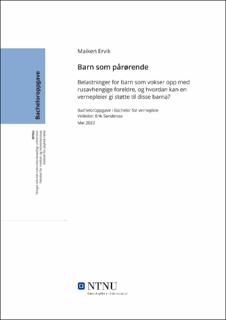Barn som pårørende
Bachelor thesis
Permanent lenke
https://hdl.handle.net/11250/3006231Utgivelsesdato
2022Metadata
Vis full innførselSamlinger
- Institutt for psykisk helse [1216]
Sammendrag
Tittel: Barn som pårørende
Problemstilling: Belastninger for barn som vokser opp med rusavhengige foreldre, og hvordan kan en vernepleier gi støtte til disse barna?
Introduksjon/bakgrunn: Ifølge folkehelseinstituttet var det i 2011 om lag 90 000 barn i Norge som hadde minst en forelder som misbrukte alkohol, dette belastet daglig fungering og funksjoner hos barn. Alkohol er det vanligste rusmidlet i Norge, legger man til andre rusmidler kan tallene være enda høyere. Det er store forskjeller mellom kunnskapen vi har om barn som pårørende og hva vi gjør i praksis. I 2010 kom det derfor lovendringer som skulle sikre barnas ivaretakelse for informasjon og oppfølging.
Hensikt: Hensikten med denne oppgaven er å belyse hvilke belastninger det har for barn å vokse opp med rusavhengige foreldre. Ut ifra dette skal jeg se på hvordan en vernepleier kan gi støtte til disse barna.
Metode: I denne oppgaven er litteraturstudie benyttet som metode. Fem fagfellvurderte artikler er benyttet for å innhente data som videre drøftes sammen med teori.
Resultat: En sammenfatning av artiklenes resultater, ble grunnlaget for oppgavens tre hovedtema: belastninger, kontakt/relasjon og tjenestebehov
Konklusjon: Teori og innhentet data viser at barn har risiko for flere belastninger knyttet til å vokse opp med rusavhengige foreldre. For å kunne gi støtte til disse barna er det viktig at vernepleieren identifiserer disse barna, for så å tilpasse seg barnets behov. Kommunikasjon og gode samtaler ses på som en nøkkel for å kunne gi god støtte. Åpenhet rundt temaet, kan være med på å redusere skam og tabu, noe som vil være viktig for at barna skal få best mulig hjelp.
Nøkkelord: Barn, støttegrupper, erfaringer, pårørende
Antall ord: 7599 Title: Children as next of kin
Issue: Burdens for children who grows grow up with drug addicted parents, how can a social worker provide support to these children´s?
Introduction/background: According to the National Institute of Public Health, there were in 2011 reported about 90 000 children in Norway who had at least one parent who abused alcohol, which burdens the daily functioning and functions children. If we count other drugs, the numbers can be even higher. There are big differences between the knowledge we have about children as next of kin and what we do in practice. Because of that, there were in 2010, changes in the law that were to ensure the children's care for information and follow-up.
Purpose: The purpose of this assignment is to shed light on the burdens for children to grow up with drug abusing parents. Based on this, I will look at how a social worker can provide support to these children.
Method: In this bachelor, literature study is used as a method. Five peer-reviewed articles have been used to obtain data that are further discussed together with theory.
Result: A summary of the articles results, became into three main themes: burdens, contact/relationship and the need of services
Conclusion: Theory and data obtained show´s that children are at risk for more burdens associated growing up with drug-addicted parents. To provide support to these children, it´s important that the social worker identifies these children, and then adapts to the child's needs. Communication and good conversations seem to be a key to being able to provide good support. Openness around the topic can help reduce shame and taboos, which will be important for the children to get the best possible help.
Key words: Children, focus groups, experiences, next of kin
Number of words: 7599
